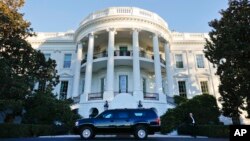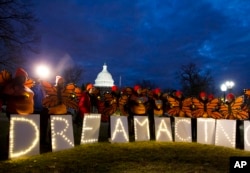The White House released details Thursday of what it characterized as a compromise framework on immigration for lawmakers to accept or reject.
For the 1.8 million young immigrants living in the United States known as "Dreamers" — who were brought to the country by their families when they were still minors — there would be a long path to citizenship, with conditions.
For those recipients who have been allowed to stay in the U.S. under the Deferred Action for Childhood Arrivals (DACA) program, as well as others who met the same criteria, there would be a "10- to 12-year path to citizenship with requirement for work, education and good moral character."
President Donald Trump, who provided a glimpse of the proposal the previous day, told reporters they should tell the Dreamers "not to worry."
The White House Framework on Immigration Reform and Border Security was released suddenly by the Trump administration, four days earlier than had been scheduled.
Another element that is certain to come under intense scrutiny is the cost of the president's core campaign promise: a $25 billion "trust fund" for a wall along the Mexico border, although that money would also be for other ports of entry and exit, and enhancements to the northern border with Canada.
Extended family migration (referred to as "chain migration" by some) — where immigrants can sponsor relatives who can then sponsor other family members — would be cut, and only spouses and minor children of citizens and lawful permanent residents would be eligible.
The administration is also calling for ending the visa lottery system for certain countries.
This is "extremely generous," according to a senior administration official.
"This is the president's position. Then it goes to the Hill [Congress], and they digest it and develop a bill they think can pass," said an official who spoke to reporters Thursday. "If it's realistic, he'll sign it. If not, he won't."
Congressional reaction
Trump's plan drew praise from some Republican lawmakers, although no promises to follow it to the letter.
Senate Majority Leader Mitch McConnell of Kentucky released a statement Thursday evening saying, "I am hopeful that as discussions continue in the Senate on the subject of immigration, members on both sides of the aisle will look to this framework for guidance as they work towards an agreement."
A spokesman for House Speaker Paul Ryan of Wisconsin was equally measured. "We're grateful for the president showing leadership on this issue and believe his ideas will help us ultimately reach a balanced solution," Doug Andres said.
"President [Barack] Obama tried and couldn't fix immigration. President [George W.] Bush tried and couldn't do it. I believe President Trump can," Republican Senator Lindsey Graham of South Carolina said in a tweet. "Today's DACA recipients can be tomorrow's #TRUMPDreamers."
Some Republican hard-liners, however, were displeased that the plan offered a concession to young immigrants.
Republican Senator Ted Cruz of Texas told reporters Thursday, "I do not believe we should be granting a path to citizenship to anybody here illegally. ... Doing so is inconsistent with the promises we made to the men and women who elected us."
Among Democrats and immigration activists, the plan was harshly criticized.
Representative Michelle Lujan Grisham of New Mexico, who is chair of the Congressional Hispanic Caucus, said in a statement, "The White House is using Dreamers to mask their underlying xenophobic, isolationist, and un-American policies, which will harm millions of immigrants living in the United States and millions of others who want to legally immigrate and contribute to our country."
David Milliband, the president and CEO of the International Rescue Committee said that already, based on current trends, the U.S. is “on track to cut by three-quarters the number of refugees allowed into the country for resettlement,” in fiscal 2018, what he called “an unprecedented assault on U.S. global leadership in this area.”
“It is no exaggeration that the future of America as a home for refugees is now on the line,” Milliband said.
“The administration’s determination to squeeze the life out of the refugee resettlement program will harm the lives, and life chances, of some of the most vulnerable people on the planet, and it sets a terrible moral example to the rest of the world.”
The IRC resettlement assessment also found that only 13 percent of refugee arrivals in fiscal 2018 identify as Muslim, compared with 48 percent in fiscal 2017.
Luis Gutierrez, a Democratic House member from Illinois, called the $25 billion figure for a border wall "ransom for Dreamers." He said the plan "doesn't pass the laugh test."
"This is going to be dead on arrival," said Frank Sharry, executive director of an immigrant rights organization called America's Voice. "We are going to expect every Democrat to oppose it."
Greisa Martinez Rosas, advocacy director for the immigrant youth group United We Dream, as well as a potential beneficiary of a new version of a Dream Act to protect young immigrants, said in a statement: "Let's call this proposal for what it is: a white supremacist ransom note. Trump and [presidential adviser] Stephen Miller killed DACA and created the crisis that immigrant youth are facing."
Deadline looms
The White House is hoping the Senate will be able to vote on the plan early next month, before the February 8 deadline for lawmakers to approve a spending bill to keep the U.S. government operating.
Many opposition Democratic Party lawmakers, as well as some from the president's Republican party, are opposed to voting for a long-term budget bill without a deal on immigration.
If there's no legislation to deal with the DACA recipients by March 5, administration officials warned Thursday, those recipients will be considered "illegal immigrants" and those who come into contact with immigration officers will be processed for deportation.


